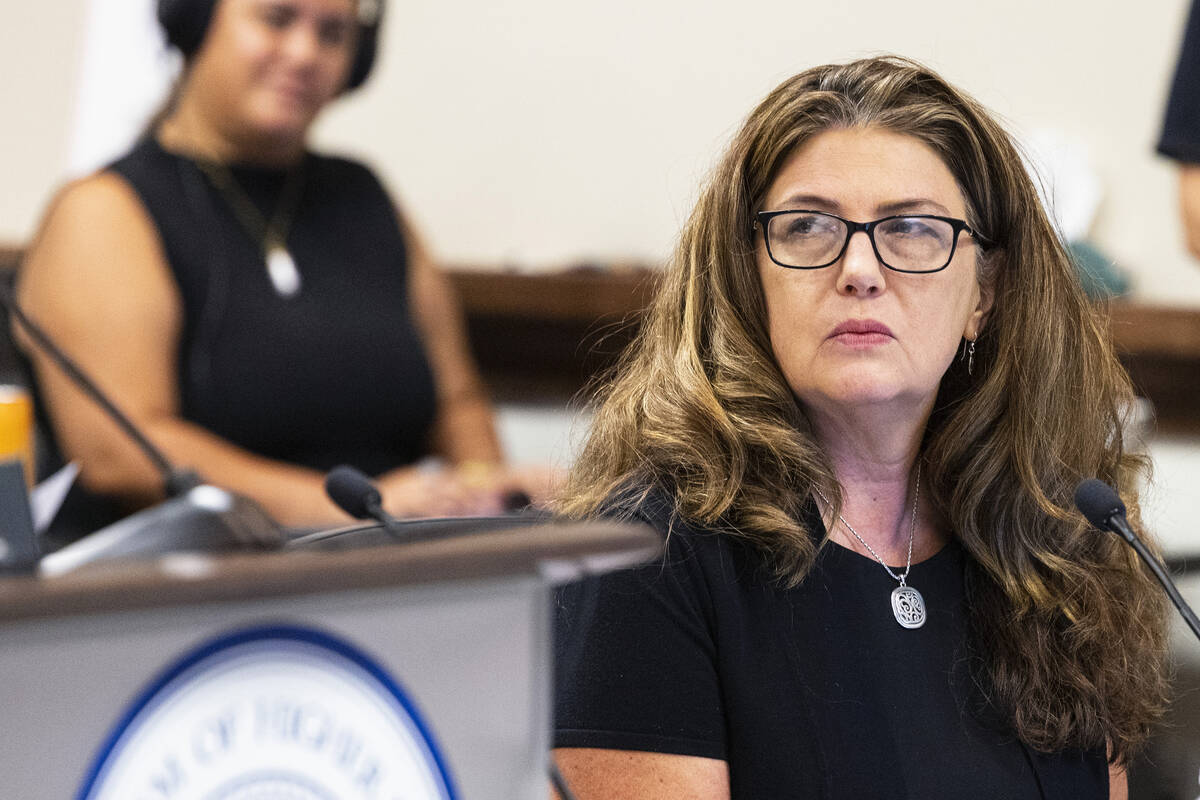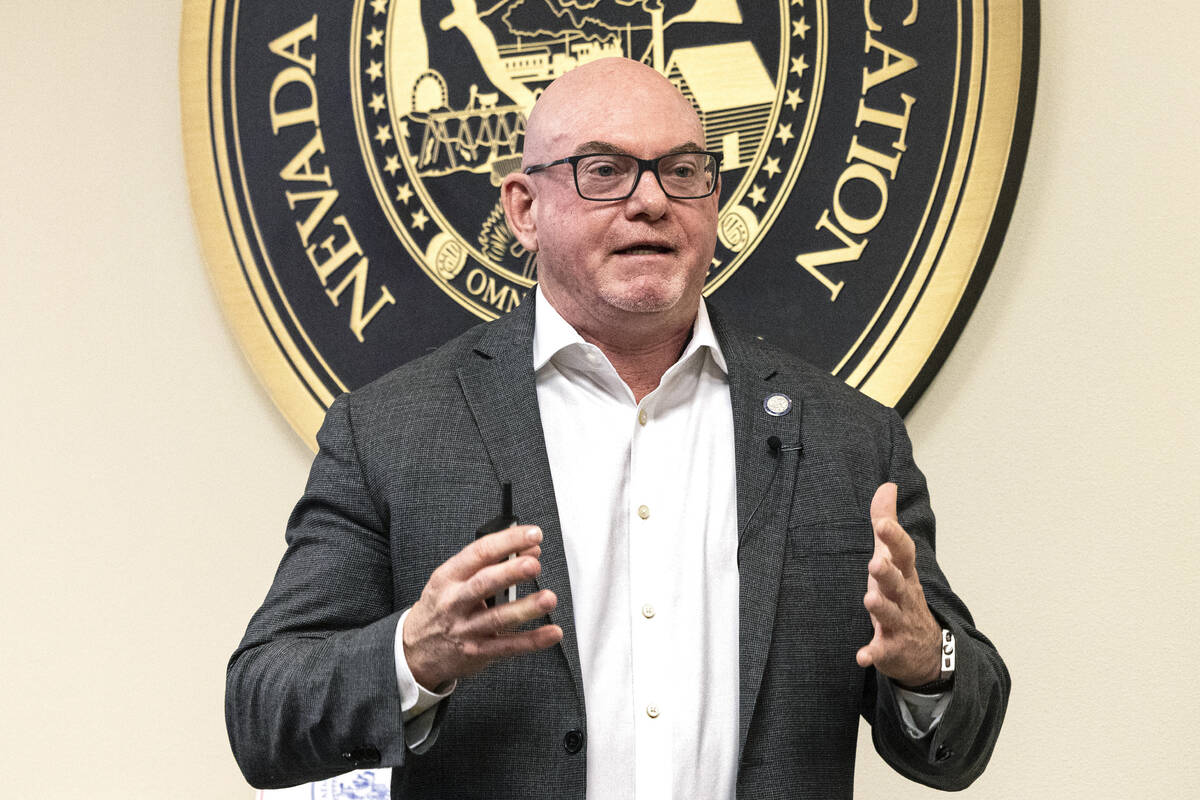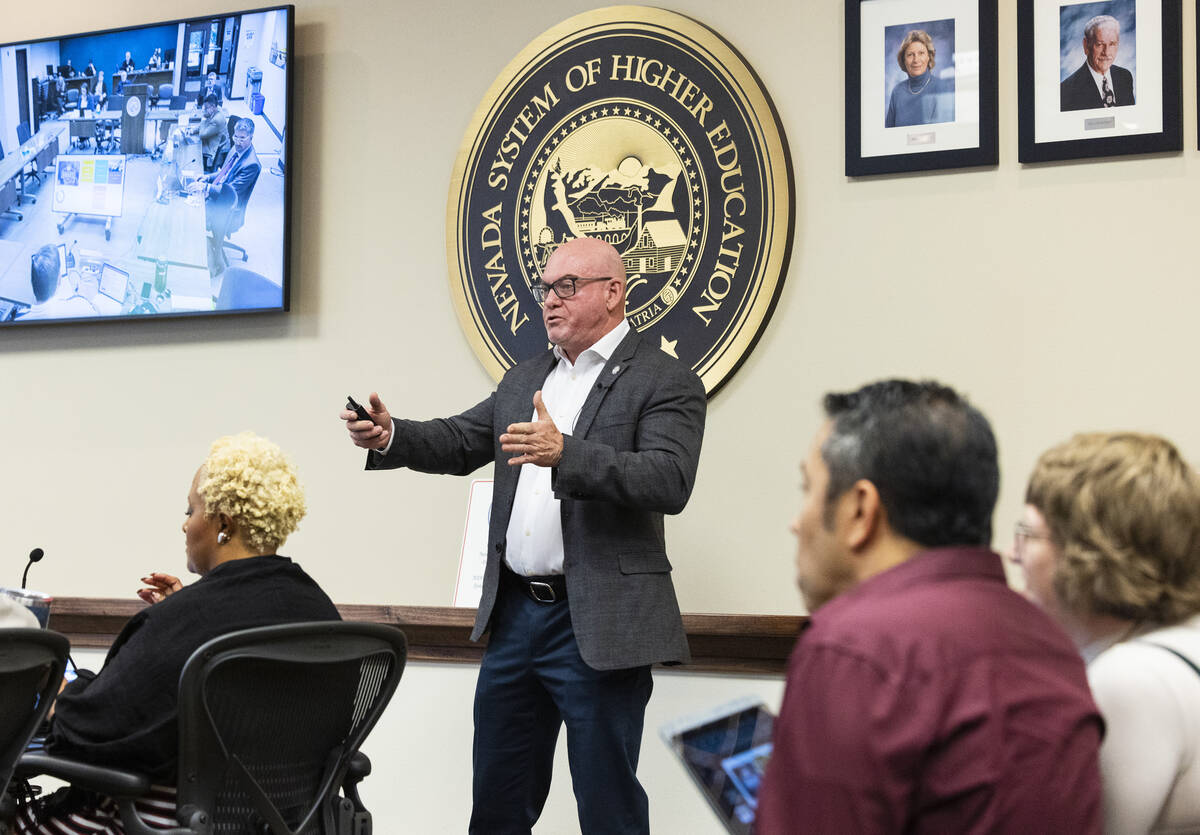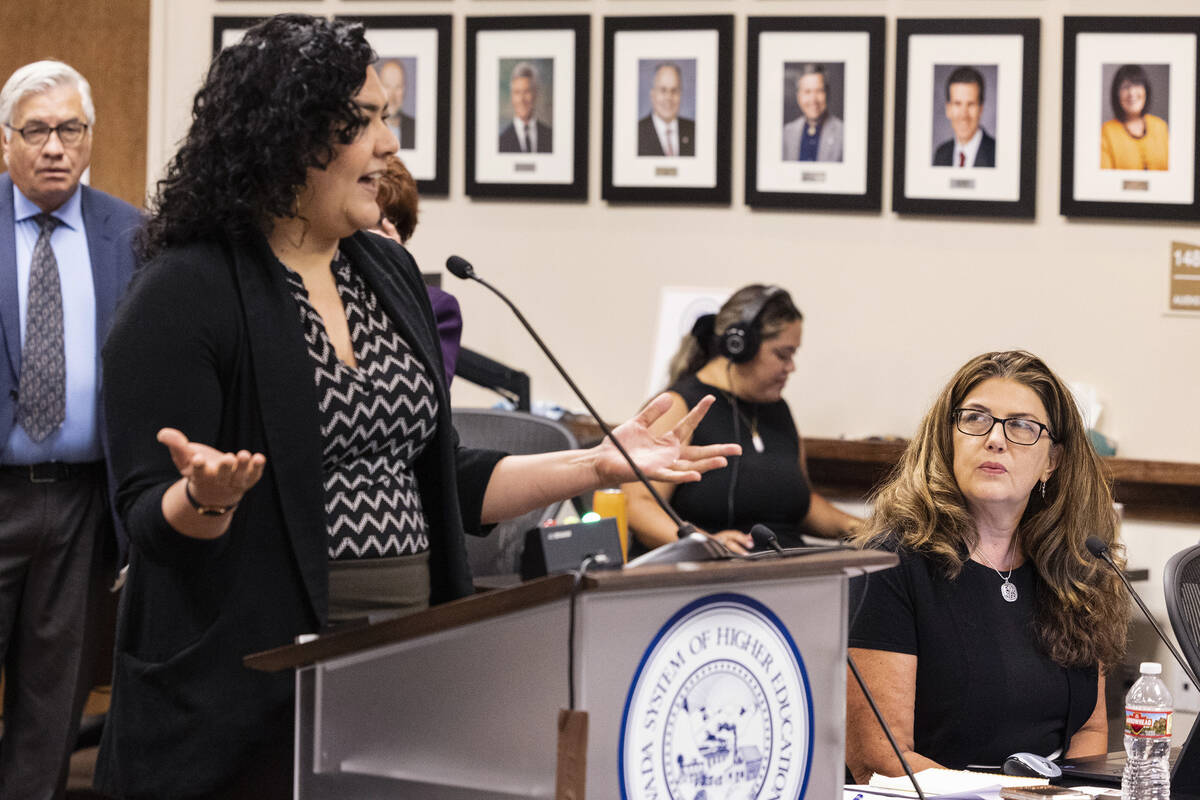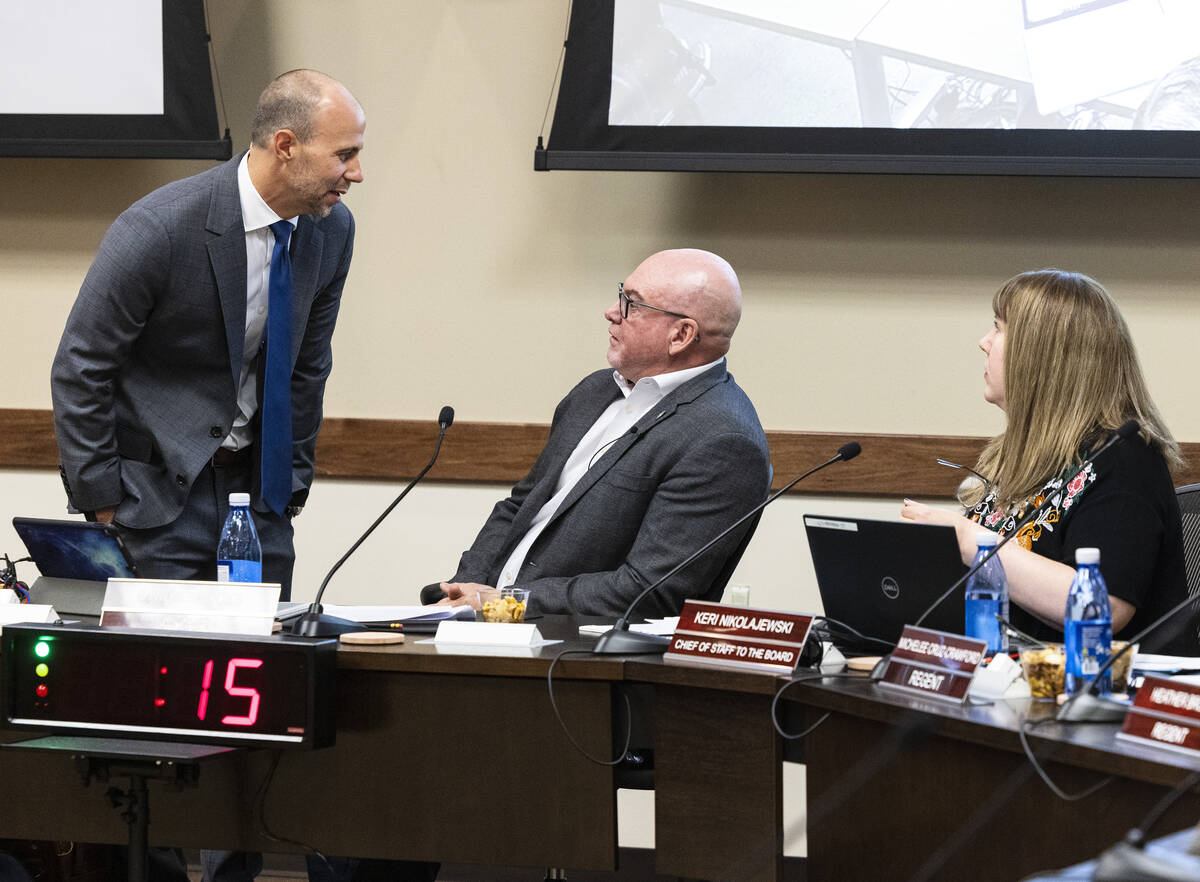Patricia ‘Patty’ Charlton will lead the state’s higher education system
Patricia “Patty” Charlton will lead the state’s higher education system as interim chancellor.
The Nevada System of Higher Education’s Board of Regents voted unanimously Tuesday to approve the hire, as well as to conduct a search for a permanent chancellor and a formal policy review.
Charlton will start as interim chancellor Sept. 4 and will remain on the job until a permanent chancellor is appointed. She’ll oversee the public college and university system, which has eight schools and serves about 100,000 students.
After the vote, some people in the meeting room clapped and cheered. Charlton told regents it was a “very humbling experience” for her and that she appreciated the vote of confidence.
She said she started in the higher education system as a student at the College of Southern Nevada and has been an NSHE employee for almost 30 years.
Charlton said she takes the role of interim chancellor “very, very seriously.”
“We have amazing institutions (and) fantastic presidents,” she said.
Speaking about the students in the system, she added: “We owe all that we can do to make this the best experience for them.”
Charlton’s yearly base salary will be $378,198. She’ll also receive an $8,000 annual car allowance and $12,000 annual housing allowance.
Charlton, who is currently NSHE’s acting vice chancellor of academic and student affairs, was previously named “officer in charge” effective Aug. 4.
She was a vice president at CSN before she retired. She joined NSHE’s system administration office earlier this year.
Charlton replaces Dale Erquiaga, who was acting chancellor for about a year starting in July 2022 until his departure earlier this month.
His contract was originally slated to continue through the end of this year, but he stepped down early. His last day was Aug. 4.
Erquiaga took the reins after Melody Rose resigned in April 2022 after less than two years on the job. Rose accepted a $610,000 buyout.
Regents conducted a search for a new chancellor, but decided in a split vote in late June to reject hiring Lawrence Drake II, interim president of Bethune-Cookman University, as the system’s next top leader.
The board then decided unanimously to discontinue the search and move forward with hiring an interim chancellor.
Public comments
During a public comment period Friday — which lasted about 20 minutes — comments were largely in support of Charlton and some also expressed concerns about the appointment process.
Retired Nevada State College President Bart Patterson said that he has known Charlton for more than 20 years and that she’s an excellent choice for the position.
Charlton is a listener and has a positive, can-do attitude, he said. “I have every confidence that she will be successful.”
Kent Ervin from the Nevada Faculty Alliance said he appreciates Charlton taking on a job that most would consider “poisonous.”
The appointment process hasn’t been transparent and regents also need consensus on what they’re looking for in a chancellor, he said.
In an Aug. 18 letter to regents, the Nevada Faculty Alliance expressed concerns about a lack of transparency and communication with the process of appointing an interim chancellor.
The alliance requested that finalist names — as well as an explanation of the search process — be disclosed publicly at least two weeks before regents voted on an interim chancellor.
“Lack of disclosure will not only lead rank and file employees to assume the appointment is a back-room deal, but it also robs the appointee of the legitimacy that is necessary to restore stability in the Nevada System of Higher Education,” the alliance wrote in the letter, which it shared with the Las Vegas Review-Journal.
Search process
Board Chair Byron Brooks gave a presentation with an overview of the process of appointing an interim chancellor.
NSHE code says the board chair and vice chair must bring a recommendation of someone to appoint within 60 days of the board’s request.
Six initial candidates came forward after the board meeting in late June when the chancellor search failed, Brooks said.
One candidate stood out, but withdrew from the process, he said, also noting they reached out to others who were suggested for the position but declined and there were others who also withdrew.
Brooks said he and Vice Chair Joe Arrascada recognized quickly there were some recruitment challenges, including where the system and board currently sits, with compensation, and unclear expectations about chancellor responsibilities.
Brooks said a final candidate was confirmed five days before the agenda posting deadline. Contract negotiations were complete one day before the posting deadline, he said, but the candidate withdrew nine hours before the posting deadline.
On Wednesday, Brooks made a phone call to Charlton — who hadn’t previously expressed interest in the interim chancellor role — to explain the predicament.
He said it made sense to bring Charlton forward as a nominee, noting she’s already in the role and would continue under a different title.
Brooks said it’s clear that NSHE policies around appointing an interim chancellor don’t align with common sense and reasonableness, including mitigating circumstances.
“I felt very boxed in on Wednesday,” he said.
There were differing opinions from a Nevada Attorney General’s Office representative and James Martines, NSHE vice chancellor and chief general counsel, on whether Brooks and Arrascada would have to abstain from voting in order to comply with Open Meeting Law.
After a brief recess to confer, Martines said they determined that state law requires the full board to appoint the chancellor.
Regent comments
Immediately after the presentation, Regent Stephanie Goodman made a motion to approve Charlton as interim chancellor.
Later, she said that it’s the right thing to do, noting that someone incredibly capable is already leading the system.
Goodman said the board should also fix the policy that constrained it in the first place.
Regent Laura Perkins said it’s encouraging that other regents are saying that changes are needed.
She also said the board needs to be aware of the academic calendar when conducting a chancellor search, noting it can’t start a search in February and expect someone to be available in June.
“This last search started at the wrong time,” Perkins said.
Regent Heather Brown said she’d rather not have the stipulation of starting a new search in the motion, noting regents haven’t had a conversation about what they’re looking for in the next chancellor.
Regent Amy Carvalho asked if it would be possible to suspend bylaws related to the 60-day timeframe for an interim chancellor recommendation in order to have more time and then work on the policies.
Martines said that wasn’t an option.
Regent Carol Del Carlo asked about pay, saying it was $300,000 for Erquiaga and wondered how it got much higher for Charlton.
She said the board has “tough financial stuff” ahead of it and she worries about the optics.
There are other presidents that haven’t been properly compensated who’ve been here a long time, Del Carlo said. “It just doesn’t seem right to me.”
Director of Human Resources Sherry Olson said there was a change in the salary schedule because of a study completed by an external consultant in 2022.
Contact Julie Wootton-Greener at jgreener@reviewjournal.com or 702-387-2921. Follow @julieswootton on X.



